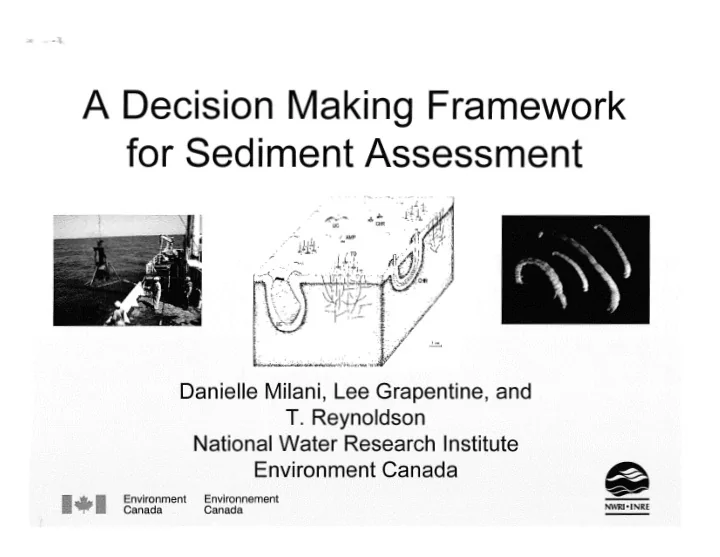

Framewor Assessmen
osophy Eleva ed concentrations of contaminants in sediments alone are not indications of ecological degradation.
on Mak Toxicity a Invertebrate Community a Biological response Biological conditions to sediment at the site \ /
Curren Decision making framework based on four elements: - community structure - numeric criteria developed toxicity - numeric criteria developed - - chemistry - numeric criteria exist - how to
dence: Commun
dence: Tox Survival and growth Hexagenia spp. direct measure of effects burrowing mayfly
Commun y and Tox Compar rence vs. "exposed" s
dence: Integrating information on chemical contamination - what constitutes a "+" ?
Method 2: - Risk based sediment guidelines for individual are incorporated int
Method 3:
dence: Adopting biomagnification criteria Does not definitively quantify biomagnification
dence: omagn Proposed decision making criteria: pass ("-"): No sig. elevation of contaminants in
on Framework
on Framework on - 4 ca egories: Category I - sediments do not pose a risk.
sion Making Framework (Category not elevated above thresholds. required. No evidence of adverse biological effects. 2 + - - - Contaminants in sediment at Contaminants do not present a Risk management evaluation elevated concentrations above risk. not required. thresholds, but not toxic; no evidence of adverse biological effects
Sedimen sion Mak ng Framework (Category 2 trophic levels but source(s) assessment to verify lack of required. unclear. contaminant availability from sed., and id source and implications. Investigate potential shift in food web dynamics. 16 + + + + Elevated sed, contamination Sufficient evidence for Risk management evaluation above thresholds likely causing unacceptable risk from required. adverse biol. Effects and sediment contamination. biomaanification..
g Framework 8 - - + + Evidence of either increased Sediments currently may not Risk management evaluation biological bioavailability or non- pose a risk, but required for biomagnification. sediment contaminant related biomagnification occurring. Determine cause(s) for benthic stress (e.g. biotic or physical Examine sources and alteration on a priority basis. differences, water column pathways of concern. Reassess, then take conditions, unknown habitat Investigate potential shift in management action as factors); potential for risk at food web dynamics (e.g. due required. higher trophic levels but to Dreissena invasion). Must source(s) unclear. confirm that sediment is not
on Making Framework (Category 4) Measured sed. contaminants Potential for adverse effects. No immediate need for risk 3 - - I - - - not elevated above thresholds. Consider comprehensive management evaluation. Lab toxicity but no evidence of analyses of contaminants in Determine cause(s) of toxicity; benthic community alteration; no lab and field biota for evidence monitor for change in status of biomagnification. of contaminant exposure and benthic populations. uptake. Risk management evaluation required. Benthic community alteration Adverse effects occurring but Determine cause(s) for benthic 9 + - -I- - may be due to sediment cause(s) unknown. alteration on a priority basis. contaminants or other stressors; Reassess, then take no toxicity, or effects may be too management action as chronicllong term for detection required; monitor for further by toxicity tests; no alteration.
Response Incorporating quantitative information into each to - / ++++ line of evidence i.e., from +I- Individual elements can be ranked (i.e. score of 1 \ (unaltered or non toxic) to 4 (very altered or toxic).
on Framework Managemen Recommenda * natural recovery * source control
Case S udy: Cornwa
Summary of Sedimen Cornwa Assessment of sediment quality at 12 Cornwall sites in 1997
Fourth Dec on Mak
comes or Cornwa - I - - - - 2 elevated concent rations above thresholds, but not toxic; no evidence of adverse biological effects. Potential for risk at higher trophic Unacceptable risk of biomagnification Rsk management evaluation for biomagnification.
ssues: Assess site stability stable? recommendation
Rule-based process integrating 4 essential lines of evidence.
Acknow edgemen
Recommend
More recommend